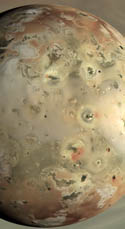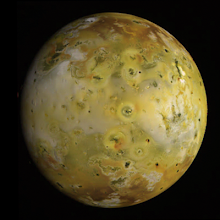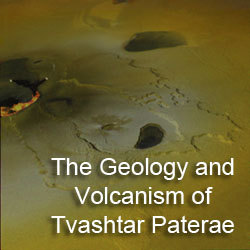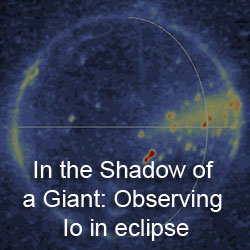As reported this morning, NASA and ESA have agreed to combine some of their pending Flagship-class mission studies for the next phase of concept studies. For the Jupiter System, this will see the combination of NASA's Europa Explorer and ESA's LAPLACE/Europa-Jupiter System Mission. According to the ESA website, the LAPLACE concept, developed last year for their Cosmic Visions: 2015-2025 strategic roadmap, was designed to include three separate spacecraft: a Europa Orbiter (likely now NASA's Europa Explorer), a Jupiter Magnetospheric Orbiter (supplied by JAXA, Japan's space agency), and a Jupiter Planetary Orbiter (now to be supplied by ESA). This international collaboration follows ESA's original plan for the LAPLACE mission concept.
It should be noted that the Jupiter Planetary Orbiter (JPO), which will perform most of the Io remote sensing, will be cost capped at 1 Billion Dollars, less than was expected when the Jupiter System Observer concept was developed. Some likely consequences of this cut include leaving JPO in Jupiter orbit rather than going into orbit around Ganymede, and the shrinking of the main camera system. Also don't forget that ESA will be trying to perform this mission with less money than will be spent on Juno, so again, one has to wonder what ESA could do on this mission (unless, as Van Kane pointed out on UMSF last year, someone else provides the launch vehicle...)
So what Io science would be preformed by ESA's Jupiter Planetary Orbiter (as originally proposed) versus NASA's Jupiter System Observer. Not much info is available on a baseline trajectory for JPO. According to an article in Experimental Astronomy, no Io flybys are specifically mentioned, though it doesn't say that NO Io flybys will be performed, just that it will mostly do Europa, Ganymede, and Callisto flybys. The article does suggest that JPO would map Io's surface with a resolution of at least 500 m/pixel.
Selection of either the Jupiter/Europa mission or the Titan/TandEM mission will take place in October/November 2008 with a new start for the approved mission next year.
Link: Laplace mission summary [sci.esa.int]
Saturday, March 22, 2008
Subscribe to:
Post Comments (Atom)










No comments:
Post a Comment